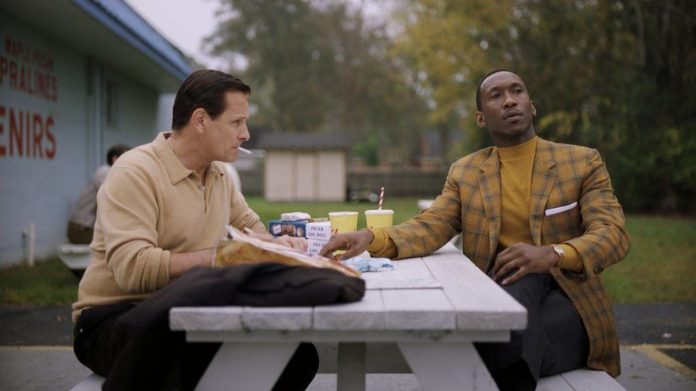As antiquated as it is mediocre, “Green Book” might have been an appropriate Best Picture winner in the 1960s. Not now.
It presents an idealized version of our past, when people drove nice cars and listened to nice music, when racism could be solved if we all just decided to talk to each other instead of fighting. The issue is more complicated than that, of course. But I’m sure it’s comforting to those proud of themselves simply for acknowledging that racism exists, if only the most obvious kind.
The film purportedly tells of the true friendship between a black concert pianist and the white bouncer he hires as his chauffeur in the early 1960s. It takes the perspective of the white one, Tony Vallelonga (Viggo Mortensen), who after losing his job gets a call to work for Dr. Don Shirley (Mahershala Ali). Shirley is starting a concert tour through the Deep South, and he needs somebody to drive and protect him. Vallelonga is hesitant to take the job because it would mean time away from his family, and because being employed by a black person may be too much for his dignity. But it pays well, so he takes it.
Predictably, Shirley and Vallelonga do not get along. But give it time, and the film’s awfully by-the-numbers screenplay will eventually make the two friends, hitting every beat with mechanical precision. They realize that they have a lot in common, and when Vallelonga sees other Southerners being slightly more racist than himself, he realizes that bigotry might be wrong. He becomes protective of Shirley, not because it is his job but because he thinks he is a good person. In the beginning, Vallelonga throws away his own drinking glasses because black repairmen use them. By the end, he lets Shirley dine with his family.
It’s a nice message, but an unnecessary one. You know how the story will end as soon as it begins, and there’s nothing to distract you from that. Moreover, the film presents a simplified version of racism, one that is easy to identify and correct. The only people who don’t already disapprove of it probably couldn’t be convinced anyway.
But the film isn’t just outdated. Its broad strokes and reductive messaging create more complications. Vallelonga in this film is a cartoonish Italian stereotype. Mortensen gives him an accent so thick it becomes self-parodying, and he eats at least one pizza by folding it in half and attempting to fit the whole thing in his mouth. Mahershala Ali fares a little better—he tries harder to give his character some nuance—but he suffers from a script that needs to create a false equivalency between the two.
The writers make Shirley an uptight, bourgeois type who has isolated himself and knows nothing of black culture, but Vallelonga apparently does. Therefore, both have something to teach the other. Vallelonga learns that racism is bad, and in a few particularly cringe-inducing scenes, Shirley learns that he loves fried chicken and Aretha Franklin. “Green Book” treats these lessons with equal import, and so white audiences, through their surrogate, can feel both accomplished and redeemed.
The main argument that director Peter Farrelly and co-writer Nick Vallelonga, real-life son of Tony, have used against its detractors is that the story is true, and thus immune to such criticisms. Some research will show that this line of defense doesn’t hold up, as Shirley’s family, Shirley died in 2013, says he was in constant contact with them the time in which the film takes place and denies that he and Tony Vallelonga were even friends. These inaccuracies make more sense when you realize that when the filmmakers say it’s true, they mean that it based solely on Tony Vallelonga’s personal stories he told his son.
That “Green Book” is now a Best Picture winner is unfortunate, especially after previous winners like Moonlight and The Shape of Water, which felt new and refreshing. Other nominees in the category do a better job blending entertainment and social commentary.
Spike Lee’s BlacKkKlansman tells an entertaining story and plays out a fascinating ideological conversation about the dangerous influence of media perception and reconciling heritage with responsibility. Even Black Panther, for all its superhero trappings, manages to have more interesting observations about America’s institutional racism.
Awarding a film that feels like it was written by a computer who, to quote “Get Out”, “would’ve voted for Obama a third time if he could’ve,” seems like a step backward. Its supporters will defend its earnestness and eagerness to please, and indeed, Universal is marketing the film as “the feel-good movie of the year.” But then we have to ask: Whose feelings are being addressed?





